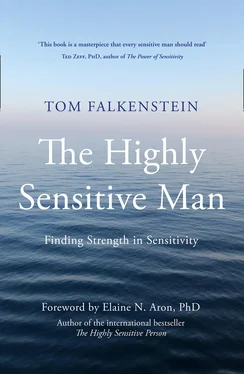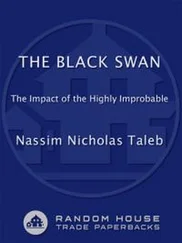What these scientific findings suggest is that Jung was probably right when he posited that “many people are more sensitive than others from birth onwards.” And it also seems to be the case that children described as “inhibited” have similar characteristics to those described in other studies as “slow to warm up”: a stronger physical and emotional reaction to new and unfamiliar situations and stimuli and withdrawn behavior. What research has also been able to show is that alongside visible differences in behavior, there are also underlying physical and biochemical differences between inhibited and uninhibited children, as well as between extroverted and introverted adults. Introverted people, for instance, display a lower pain threshold and generally react more sensitively to external stimulation, such as visual and aural stimuli. 9Both the British psychologist Jeffrey Alan Gray and the American psychiatrist C. Robert Cloninger have created influential models that suggest that personality differences between people can be explained by biological causes. 10
For a long time, though, inhibited behavior among children had been judged negatively because it was connected with the development of anxiety disorders in adulthood. A sensitivity to new environmental stimuli was seen as representing a higher level of vulnerability or susceptibility and was thus judged to be a risk factor in the development of psychological problems, as well as being connected with shyness in both children and adults.
But could being more sensitive to external stimuli actually be advantageous? And could the same fundamental higher sensitivity be the underlying cause of all of these different behavioral characteristics, be they “slow to warm up,” “behaviorally inhibited,” “withdrawn,” or “introverted”? It was these questions that a series of researchers began to ask in the 1990s, with fascinating results.
The Advantages of Being More Sensitive to Your Environment
So we have now learned that research into temperament suggests that, pretty much from birth onward, people register information from their environment differently from each other and also that they differ in their observable reactions and behaviors. These differences in sensitivity are not only seen among people, but have also been observed to date in over one hundred different animals, including rhesus monkeys, mice, dogs, zebra finches, fruit flies, and fish. 11
Be it in a human being or a zebra finch, we can observe two distinct strategies when animals or people are faced with new or what initially appear to be threatening situations. One group behaves reactively , that is to say, they wait and become observant and cautious before they act. The other group, however, when faced with the same situation, reacts proactively , displaying daring and aggressive behavior and actively exploring the situation. Neither of these strategies is better than the other, both have advantages and disadvantages depending on the situation, so it seems that, for many species, it has paid off to retain both types.
Since the 1990s, a number of different models and hypotheses have been created to explain the individual differences in human sensitivity, including Jay Belsky and Michael Pluess’s differential susceptibility theory, W. Thomas Boyce and Bruce J. Ellis’s biological sensitivity to context, and Elaine Aron’s sensory processing sensitivity. Although these theories all have their differences, the Swiss psychologist and researcher Pluess uses the umbrella term environmental sensitivity to broadly describe all of them. 12What all of these theories have in common, in comparison to the earlier temperamental theories outlined above, is that they foreground the term sensitivity , which they judge neutrally, sometimes even identifying advantages associated with this higher sensitivity. Numerous studies over the past few years have clearly shown that those people who react more sensitively to their environment, react more strongly not only to negative events but also to positive events.
This means that being highly sensitive does not, as had previously been thought, necessarily lead to an increase in psychological vulnerabilities or disadvantages, but that, on the contrary, in the right surroundings, it can actually be an advantage. Both Belsky and Pluess have been able to show that it is precisely those particularly sensitive children, whom we once called “slow to warm up,” “difficult,” or “behaviorally inhibited,” who most profit from a caring and loving relationship with their parents and consequently receive better grades and display higher social competencies than those children with “easy” temperaments. 13As Pluess said during a conversation with me, “We were able to show that children with ‘difficult’ temperaments developed better in positive, supportive surroundings than other children, precisely because their higher sensitivity meant that they reacted more strongly to positive influences.” This is what Pluess calls “differential susceptibility”—that being sensitive means you suffer more from being in a negative environment, but also that you thrive more in a positive environment.
Belsky and Pluess believe that there are biological and evolutionary reasons why differences in individuals’ sensitivities could be advantageous for a whole species when faced with uncertain conditions. If one strategy does not pay off, then the existence of the species could be assured by the alternative strategy. According to Belsky and Pluess, these differences manifest themselves in a more sensitive central nervous system and are influenced by genetics and prenatal and early postnatal factors. These individuals then react more sensitively to their environment and are thus more formed by it, a process that they can profit from. 14It could thus be the case that differences in the sensitivity of people’s nervous systems is a natural phenomenon.
Boyce and Ellis’s theory of biological sensitivity to context is also based on the idea that being more sensitive is not necessarily a disadvantage for those affected, and can indeed be an advantage. But this is only the case when these particularly sensitive children grow up in a caring, loving, and supportive environment. Then the advantages of their sensitive nature becomes clear because they profit more strongly from these positive experiences and relationships than those who are less sensitive, precisely because they are so open to and affected by external influences and thus are more influenced by them than less sensitive children.
Boyce, who teaches at the University of California, Berkeley, has been able to observe that around 15 to 20 percent of all children react particularly sensitively to their environment. He refers to these children as “orchid children” and calls all other children “dandelion children,” because, like robust dandelions, they can “grow anywhere” and have less “complicated care needs.” The orchid children, on the other hand, are more pliable and react more sensitively to their environment. Boyce discovered that orchid children react particularly strongly to negative factors in their surroundings, which he measured based on their heart rates and their levels of cortisol (which is sometimes called the stress hormone because it is released at increasingly high levels when people are stressed). These children tended to react more often with behavioral problems when faced with negative situations in the family, such as money worries, illness, or parental conflict, in comparison with the dandelion children. In later life, these orchid children were more susceptible to developing problematic behaviors and psychological problems, including drug abuse and depression. But if those same particularly sensitive and malleable children grew up in low-stress, loving, and supportive surroundings, then they were happier, more productive, and healthier than the dandelion children. 15, 16
Читать дальше












